- Home
- Deborah Harkness
Shadow of Night: A Novel Page 24
Shadow of Night: A Novel Read online
Page 24
Having displayed the clock with suitable ceremony, Philippe began a tribute to friends past and present and family new and old, as befitted a festival honoring the ancient god. He named every creature the community had lost over the past year, including (when prompted by the Lord of Misrule) Thomas’s kitten, Prunelle, who had died tragically by misadventure. The hand continued to inch toward twelve.
At midnight precisely, the ship detonated with a deafening explosion. The clock shuddered to a stop in its splintered wooden case.
“Skata.” Philippe looked sadly at his ruined clock.
“Monsieur Finé, God rest his soul, would not be pleased with your improvements to his design.” Matthew waved the smoke from his eyes as he bent to take a closer look. “Every year Philippe tries something new: jets of water, chiming bells, a mechanical owl to hoot the hours. He’s been tinkering with it ever since King François lost it to him in a card game.”
“The cannon were supposed to fire little sparks and give a puff of smoke. It would have amused the children,” said Philippe indignantly. “Something was amiss with your gunpowder, Matthaios.”
Matthew laughed. “Evidently not, judging by the wreckage.”
“C’est dommage,” Thomas said with a sympathetic shake of the head. He was crouched next to Philippe, his crown askew and a look of adult concern on his face.
“Pas de problème. Next year we will do better,” Philippe assured Thomas breezily.
Shortly thereafter we left the people of Saint-Lucien to their gambling and revelry. Upstairs, I lingered by the fireside until Matthew doused the candles and got into bed. When I joined him, I hitched up my night rail and straddled his hips.
“What are you doing?” Matthew was surprised to find himself flat on his back in his own bed, his wife looking down at him.
“Misrule wasn’t just for men,” I said, running my nails down his chest. “I read an article about it in graduate school, called ‘Women on Top.’”
“Accustomed as you are to being in charge, I cannot imagine you learned much from it, mon coeur.” Matthew’s eyes smoldered as I shifted my weight to trap him more securely between my thighs.
“Flatterer.” My fingertips traveled from his trim hips up and over the ridges in his abdomen and across the muscles in his shoulders. I leaned over him and pinned his arms to the bed, giving him an excellent view of my body through the night rail’s open neckline. He groaned.
“Welcome to the world turned upside down.” I released him long enough to remove my night rail, then grasped his hands and lowered myself onto his chest so that the tips of my bare breasts brushed his skin.
“Christ. You’re going to kill me.”
“Don’t you dare die now, vampire,” I said, guiding him inside me, rocking gently, holding out the promise of more. Matthew reacted with a low moan. “You like that,” I said softly.
He urged me toward a harder, faster rhythm. But I kept my movements slow and steady, reveling in the way our bodies fit. Matthew was a cool presence at my core, a delicious source of friction that heated my blood. I was staring deep into his eyes when he climaxed, and the raw vulnerability there sent me hurtling after him. I collapsed onto his torso, and when I moved to climb off, his arms tightened around me.
“Stay there,” he whispered.
I did stay, until Matthew woke me hours later. He made love to me again in the quiet before the dawn and held me as I underwent the metamorphosis from fire to water to air and returned once more to dreams.
***
Friday marked the shortest day of the year and the celebration of Yule. The village was still recovering from Saturnalia and had Christmas yet before them, but Philippe was undeterred.
“Chef butchered a hog,” he said. “How could I disappoint him?”
During a break in the weather, Matthew went to the village to help repair a roof that had collapsed under the weight of the latest snowfall. I left him there, throwing hammers down a ridgepole to another carpenter and delighted at the prospect of a morning of grueling physical labor in freezing temperatures.
I closeted myself in the library with a few of the family’s finer alchemical books and some blank sheets of paper. One was partially covered with doodles and diagrams that would have made sense to no one but me. With all that was happening in the château, I’d abandoned my attempts to make spirit of wine. Thomas and Étienne wanted to be running around with their friends and sticking their fingers into Chef’s latest cake batter, not helping me with a science experiment.
“Diana.” Philippe was moving at great speed and was halfway into the room before he noticed me. “I thought you were with Matthew.”
“I couldn’t bear to see him up there,” I confessed. He nodded in understanding.
“What are you doing?” he asked, looking over my shoulder.
“Trying to figure out what Matthew and I have to do with alchemy.” My brain felt fuzzy with disuse and lack of sleep.
Philippe dropped a handful of small paper triangles, scrolls, and squares onto the table and pulled up a chair. He pointed to one of my sketches. “This is Matthew’s seal.”
“It is. It’s also the symbols for silver and gold, the moon and the sun.” The hall had been decorated with spangled versions of these heavenly bodies for Saturnalia. “I’ve been thinking about it since Monday night. I understand why a witch might be symbolized by the crescent moon and silver—they’re both linked to the goddess. But why would anyone use a sun or gold to denote a vampire?” It went against every bit of popular lore.
“Because we are unchanging. Our lives do not wax or wane, and, like gold, our bodies resist corruption from death or disease.”
“I should have thought of that.” I made some notes.
“You have had a few other things on your mind.” Philippe smiled. “Matthew is very happy.”
“Not only because of me,” I said, meeting my father-in-law’s gaze. “Matthew is happy to be with you again.”
Shadows scudded through Philippe’s eyes. “Ysabeau and I like it when our children come home. They have their own lives, but it doesn’t make their absence any easier to bear.”
“And today you are missing Gallowglass, too,” I said. Philippe seemed uncharacteristically subdued.
“I am.” He stirred the folded papers with his fingers. “It was Hugh, my eldest, who brought him into the family. Hugh always made wise decisions when it came to sharing his blood, and Gallowglass was no exception. He is a fierce warrior with his father’s sense of honor. It comforts me to know that my grandson is in England with Matthew.”
“Matthew seldom mentions Hugh.”
“He was closer to Hugh than to any of his other brothers. When Hugh died with the last of the Templars at the hands of the church and the king, it shook Matthew’s loyalties. It was some time before he was able to free himself of his blood rage and come back to us.”
“And Gallowglass?”
“Gallowglass is not yet ready to leave his grief behind, and until he does so, he will not set foot in France. My grandson exacted retribution from the men who betrayed Hugh’s trust, as did Matthew, but revenge is never an adequate remedy for loss. One day my grandson will return. I am sure of it.” For a moment Philippe looked old, no longer the vigorous ruler of his people but a father who had suffered the misfortune to outlive his sons.
“Thank you, Philippe.” I hesitated before covering his hand with mine. He clasped it briefly and stood. Then he took up one of the alchemy books. It was Godfrey’s beautifully illustrated copy of the Aurora Consurgens, the text that had first lured me to Sept-Tours.
“Such a curious subject, alchemy,” Philippe murmured, flipping through the pages. He found the picture of the Sun King and the Moon Queen jousting on the back of a lion and a griffin, and he smiled broadly. “Yes, this will do.” He tucked one of his paper shapes between the pages.
“What are you doing?” I was overcome with curiosity.
“It is a game that Ysabeau and I play. Wh
en one of us is away, we leave messages hidden in the pages of books. So much happens in a day, it is impossible to remember everything when we see each other again. This way we can come upon little memories like this one when we least expect it, and share them.”
Philippe went to the shelves and picked out a volume in a worn leather binding. “This is one of our favorite stories, The Song of Armouris. Ysabeau and I have simple tastes and enjoy stories of adventure. We are always hiding messages in this.” He stuffed a scroll of paper down the spine between the binding and the gatherings of vellum. A folded rectangle fell out of the bottom as he worked it into the tight space.
“Ysabeau has taken to using a knife so that her messages are harder to find. She is full of tricks, that one. Let’s see what she says.” Philippe opened up the paper and read it silently. He looked up with a twinkle in his eyes and cheeks that were redder than usual.
I laughed and rose. “I think you might need more privacy to compose your reply!”
“Sieur.” Alain shifted in the doorway, his face serious. “Messengers have arrived. One from Scotland. Another from England. A third from Lyon.”
Philippe sighed and cursed under his breath. “They might have waited until after the Christian feast.”
My mouth soured.
“It cannot be good news,” Philippe said, catching my expression. “What did the messenger from Lyon report?”
“Champier took precautions before he left and told others that he had been called here. Now that he has not returned home, his friends are asking questions. A group of witches is preparing to leave the city in search of him, and they are headed in this direction,” Alain explained.
“When?” I whispered. It was too soon.
“The snow will slow them, and they will find travel difficult over the holy days. A few more days, perhaps a week.”
“And the other messengers?” I asked Alain.
“They are in the village, looking for milord.”
“To call him back to England, no doubt,” I said.
“If so, Christmas Day will be the best time to set out. Few will be on the roads, and the moon will be dark. These are ideal travel conditions for manjasang, but not for warmbloods,” Philippe said matter-of-factly. “There are horses and lodgings ready for you as far as Calais. A boat waits to take you to Dover. I sent word to Gallowglass and Raleigh to prepare for your return.”
“You’ve been expecting this,” I said, shaken at the prospect of leaving. “But I’m not ready. People still know I’m different.”
“You blend in better than you think. You’ve been conversing with me in perfectly good French and Latin all morning, for instance.” My mouth opened in disbelief. Philippe laughed. “It is true. I switched back and forth twice, but you didn’t notice.” His face grew serious. “Shall I go down and tell Matthew about my arrangements?”
“No,” I said, my hand on his arm. “I’ll do it.”
Matthew was sitting on the ridgepole, a letter in each hand and a frown on his face. When he spotted me, he slid down the slope of an eave and landed on the ground with the grace of a cat. His happiness and lighthearted banter of this morning were nothing more than a memory. Matthew removed his doublet from a rusted torch bracket. Once he’d shrugged it over his shoulders, the carpenter was gone and the prince had returned.
“Agnes Sampson confessed to fifty-three indictments of witchcraft.” Matthew swore. “Scottish officials have yet to learn that heaping on charges makes every single one look less convincing. According to this account, the devil reported to Sampson that King James was his greatest enemy. Elizabeth must be delighted not to find herself in first place.”
“Witches don’t believe in the devil,” I told him. Of all the bizarre things humans said about witches, this was the most incomprehensible.
“Most creatures will believe in anything that promises to bring an end to their immediate misery if they’ve been starved, tortured, and frightened for weeks on end.” Matthew ran his fingers through his hair. “Agnes Sampson’s confession—unreliable as it is—provides proof that the witches are meddling in politics, just as King James contends.”
“Thereby breaking the covenant,” I said, understanding why Agnes had been so vigorously pursued by the Scottish king.
“Yes. Gallowglass wants to know what to do.”
“What did you do when you were here . . . before?”
“I let Agnes Sampson’s death pass unchallenged, a proper civil punishment for a crime that was outside the bounds of Congregation protection.” His eyes met mine. Witch and historian struggled with the impossible choice before me.
“Then you have to keep silent again,” I said, the historian winning the contest.
“My silence will mean her death.”
“And your speaking out will change the past, perhaps with unimaginable consequences for the present. I don’t want the witch to die any more than you do, Matthew. But if we start changing things, where will we stop?” I shook my head.
“So I will watch the whole gruesome business in Scotland unfold, again. This time it looks so different, though,” he said reluctantly. “William Cecil has directed me to return home so that I can gather intelligence on the Scottish situation for the queen. I have to obey his orders, Diana. I don’t have a choice.”
“We’d have to go to England even without Cecil’s summons. Champier’s friends have noticed he’s missing. And we can leave immediately. Philippe’s been making arrangements for a speedy departure, just in case.”
“That’s my father,” Matthew said with a humorless laugh.
“I’m sorry we have to leave so soon,” I whispered.
Matthew hooked me into his side. “If not for you, my last memories of my father would be of a broken shell of a man. We must take the bitter with the sweet.”
Over the next several days, Matthew and his father went through a ritual of farewell that must have been familiar, given all the good-byes the two had exchanged. But this time was unique. It would be a different Matthew who would next come to Sept-Tours, one with no knowledge of me or of Philippe’s future.
“The people of Saint-Lucien have long known the company of manjasang,” Philippe assured me when I worried how Thomas and Étienne would be able to keep it all secret. “We come, we go. They ask no questions, and we offer no explanations. It has always been this way.”
Even so, Matthew made sure his own plans were clear. I overheard him talking with Philippe in the hay barn after a morning of sparring.
“The last thing I will do before we return to our own time is to send you a message. Be ready to order me to Scotland to secure the family’s alliance with King James. From there I should go to Amsterdam. The Dutch will be opening up trade routes with the East.”
“I can manage, Matthew,” Philippe said mildly. “Until then I expect regular updates from England and news of how you and Diana are faring.”
“Gallowglass will keep you abreast of our adventures,” Matthew promised.
“It is not the same thing as hearing it from you,” Philippe said. “It will be very difficult not to gloat over what I know of your future when you get pompous, Matthew. Somehow I will manage that, too.”
Time played tricks on us during our last days at Sept-Tours, first dragging, then accelerating without warning. On Christmas Eve, Matthew went down to the church for Mass along with most of the household. I remained in the château and found Philippe in his office on the other side of the great hall. He was, as ever, writing letters.
I knocked on the door. It was a formality, since he had no doubt been tracking my approach since I’d left Matthew’s tower, but it didn’t seem right to barge in uninvited.
“Introite.” It was the same command he’d issued when I’d first arrived, but it sounded so much less forbidding now that I knew him better.
“I’m sorry to disturb you, Philippe.”
“Come in, Diana,” he said, rubbing his eyes. “Did Catrine find my boxes?”
&nb
sp; “Yes, and the cup and pen case, too.” He insisted that I take his handsome traveling set on the journey. Each item was made of stiffened leather and could withstand the perils of snow, rain, and rough handling. “I wanted to be sure to thank you before we left—and not just for the wedding. You fixed something in Matthew that was broken.”
Philippe pushed his stool back and studied me. “It is I who should be thanking you, Diana. The family has been trying to mend Matthew’s spirit for more than a thousand years. If I’m remembering correctly, it took you less than forty days.”
“Matthew wasn’t like this,” I said with a shake of the head, “not until he was here, with you. There was a darkness in him that I couldn’t reach.”
“A man like Matthew never frees himself of the shadows completely. But perhaps it is necessary to embrace the darkness in order to love him,” Philippe continued.
“‘Do not refuse me because I am dark and shadowed,’” I murmured.
“I do not recognize the verse,” Philippe said with a frown.
“It’s from that alchemical book I showed you earlier—the Aurora Consurgens. The passage reminded me of Matthew, but I still don’t understand why. I will, though.”
“You are very like that ring, you know,” Philippe said, tapping his finger on the table. “It was another of Ysabeau’s clever messages.”
“She wanted you to know she approved of the marriage,” I said, my thumb reaching for the comforting weight.
“No. Ysabeau wanted me to know she approved of you. Like the gold from which it is made, you are steadfast. You hide many secrets within you, just as the bands of the ring hide the poesies from view. But it is the stone that best captures who you are: bright on the surface, fiery within, and impossible to break.”
“Oh, I’m breakable,” I said ruefully. “You can shatter a diamond by hitting it with an ordinary hammer, after all.”
“I’ve seen the scars Matthew left on you. I suspect there are others, too, though less visible. If you did not fall to pieces then, you will not now.” Philippe rounded the table. He kissed me tenderly on each cheek, and my eyes filled.

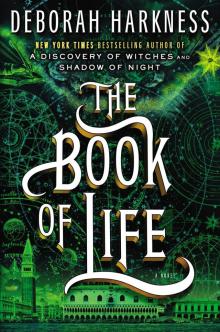 The Book of Life
The Book of Life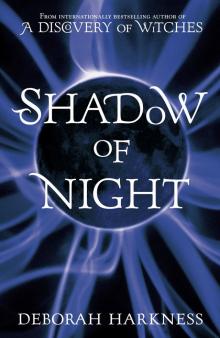 Shadow of Night
Shadow of Night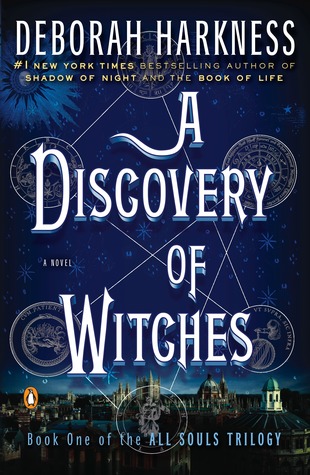 A Discovery of Witches
A Discovery of Witches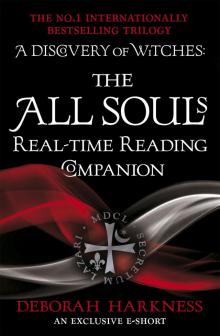 The All Souls Real-Time Reading Companion
The All Souls Real-Time Reading Companion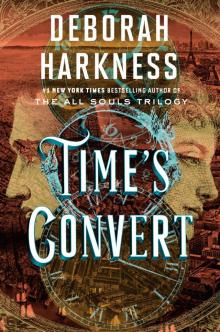 Time's Convert
Time's Convert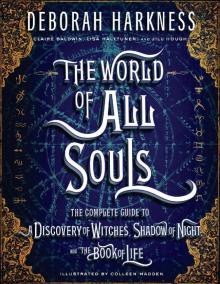 The World of All Souls
The World of All Souls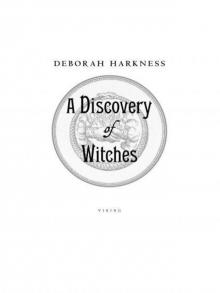 A Discovery of Witches: A Novel (All Souls Trilogy)
A Discovery of Witches: A Novel (All Souls Trilogy)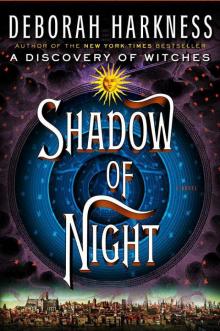 Shadow of Night: A Novel
Shadow of Night: A Novel